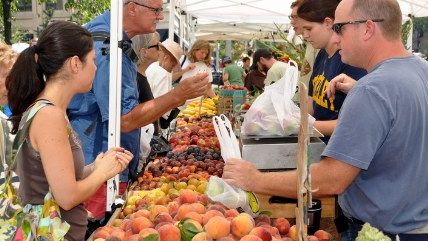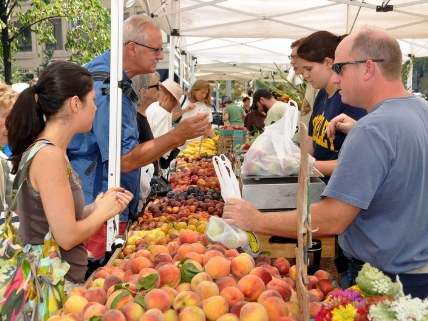Lawmakers and Regulators Act Like They Hate Farmers Markets
Existential threats from meddlesome rulemakers


Last weekend I shopped for the first time at a farmers market in Seattle's University District, near my new home in the city's Wallingford neighborhood. I visited vendors there who sold everything from hazelnuts to salmon, beef, lamb, cheeses, root vegetables, kimchi, sauerkraut, kefir, hard cider, and quesadillas.
This was a different sort of farmers market visit for me—and not just because the U District market has a far better and more interesting selection of foods than did the Washington, D.C.-area markets I used to frequent. What made this trip really different is that I typically find it doesn't take much for farmers and other market vendors to open up about how some combination of federal, state, and local regulations is making their lives—and livelihoods—increasingly difficult.
Over the years, I've visited a rich diversity of farmers markets in at least two-dozen states—including in Louisiana, Massachusetts, Hawaii, North Carolina, Iowa, Texas, Illinois, and California—and have heard farmers and other vendors rightly groan in nearly every case about overly burdensome regulations. But at the U District market, the only vendor complaints I heard were about the rain and snow that day, or about the seasonally affected shortage of vendors and their offerings.
My unscientific sampling of a handful of vendors at one farmers market (along with earlier visits to the nearby Ballard and Fremont markets, which yielded similar results) doesn't mean that farmers in Seattle or Washington State face few regulatory challenges. A simple Google search reveals such hurdles do exist, including in the farmers market held during warmer months in the parking lot right outside my apartment.
But for every city or state where farmers might not be compelled by awful regulations to lament during every market about how they're drowning in red tape, their peers in dozens of other states must do so, because awful rules mean they face existential threats.
The past month alone has provided ample evidence of this unfortunate truth. For example, in St. Augustine, Fla., a recent city council meeting to discuss a local farmers market was punctuated by what the St. Augustine Record characterizes as "bickering," "shouts[,] and grumbling." The issue? Whether to renew a lease that would let the city's Wednesday night market survive.
The survival of a farmers market is also at issue across the country in Sonoma, Calif., where the city council recently inserted itself into a debate between what the Sonoma Index-Tribune calls a dispute between farmers market "purists" who want markets to feature mainly farmed foods like meat and produce and "moderns" who prefer such foods with a side of music and food trucks.
Is the purist or the modern vision of a farmers market the proper one? I wouldn't want to see farmers squeezed out of a farmers market. But I'm certain local consumers—rather than me, or you, or local lawmakers—know best what they want to see at their farmers market. Locals "fear that the Council majority is out to ruin the market," Sonoma farmers market customer Gina Cuclis told the Index-Tribune. "It's not the City Council's job to micromanage the market."
While the fight in California and Florida is over whether and how to allow a farmers market to continue its existence, in Chesapeake, Va., the question is whether to legalize farmers markets at all. Current rules make it nearly impossible for private farmers markets to operate in the city.
"There is currently no definition of farmers markets in the city code," reports the Virginian-Pilot. "They're considered flea markets and subject to a laborious—and potentially expensive—approval process."
Other farmers market controversies have popped up in recent years in such widespread locales as Nashville, Ann Arbor, Collier County (Fla.), Turlock, Calif., and Long Island.
My recent book Biting the Hands that Feed Us is also chock full of atrocities committed by lawmakers and regulators against farmers markets. For example, I describe how one Massachusetts town's bizarre rules about lettuce helped drive a local farmer from its farmers market.
In Pennsylvania, I describe how a new law adopted in 2012 threatened to force farmers who wanted to sell at markets anywhere in the state to invest in costly refrigerated trucks and handwashing sinks when far less costly options—ice chests in the case of the former, and a shared sink or a $2 bottle of hand sanitizer in the case of the latter—are equally effective.
I also detail how similar rules in Mississippi have prevented livestock farmers there from selling meat and other animal products at local farmers markets across the state. And I describe how New York State regulators told cheese vendors selling at markets in New York City that they effectively could no longer offer samples to customers who might want to taste a cheese before buying it, and could no longer cut cheese (ahem) at the market to meet customer specifications.
I love farmers markets. I'm also thrilled to live across the street from a great 24-hour grocery. Lawmakers and regulators should stop getting in the way of farmers and consumers who want to make similar selling and buying choices.


Show Comments (63)